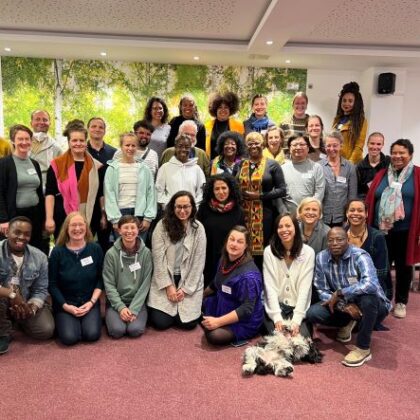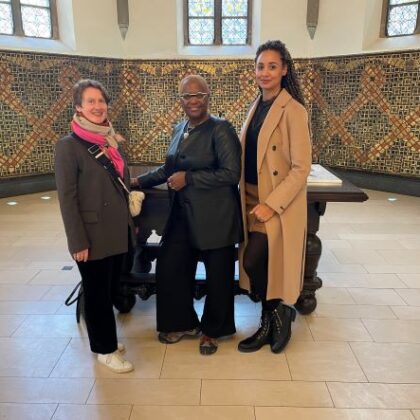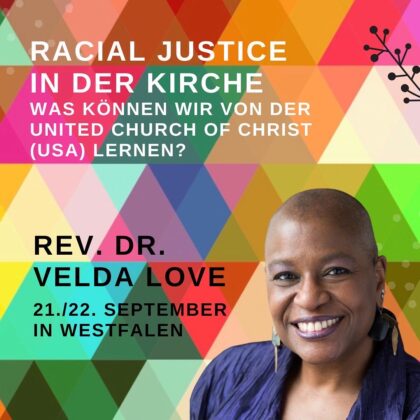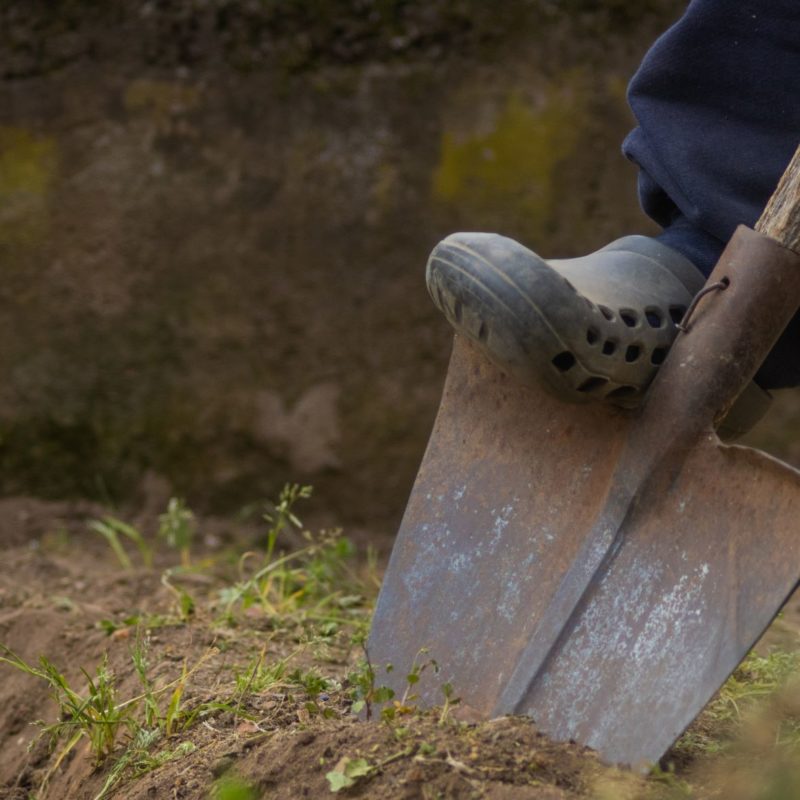Beyond Translation: Cultivating Racial Justice Solidarity
I was invited to the third annual conference “Church and Racism”, a gathering for BIPOC faith leaders—clergy, theology students, lay leaders, and white allies. Josephine Furian, a Sacred Conversations to End Racism (SC2ER) certified facilitator invited me to share my work based on the restorative racial justice journey study I created for the United Church of Christ. Josephine applied, was accepted, and completed SC2ER facilitator training in 2020. Her ongoing commitment to seeing anti-racism and racial justice taken seriously and implemented within the Church in Germany led her to translate portions of the SC2ER study guide into German for others to experience.
My hosts also included Nathaly Kurtz, Ulrike La Gro, Ly-Elizabeth Dang, and Goren Sobatic. Nathaly, Ulrike, and Ly-Elizabeth are currently in the SC2ER 2022-2025 cohort. Ulrike is studying theology at Goethe University Frankfurt. Goran is completing his second year of SC2ER facilitator training with anticipation of certification in 2023.
The leaders within the BIPOC community blessed me deeply as I led anti-racism workshops. I felt their words (in German) moving through my spirit, which often did not need translation because they resonated with sincere desires to be heard, respected, seen, and part of the changes that need to happen so that racial justice is a reality. The future of the German church will be in the capable hands of current theology students, and clergy of diverse people groups of color from across the country.
As we concluded day two of racial justice and anti-racism workshops, I asked members of the BIPOC community to name out loud what they needed and wanted from their Church and white allies.
“We want a church that sees us in our strength and not as victims or in need of help. We want a Church that understands our pain, to experience racism on a daily basis, that grieves with us and keeps us going. We want a Church that is not compliant with injustice. We want a church in which we do not have to explain ourselves again and again. We want a church in which space is made and white people resign because other perspectives are needed for the good of the community. We want a church in which the diversity of theology can stand side by side on an equal footing.”
I was grateful for my time with new siblings and faithful restorative racial justice solidarity partners. I committed to being available when needed, share resources, encouragement, and support. My hope is to return in two-years to share stories, celebrate graduations, and continue our shared work toward racial justice.
Confronting Colonial Histories: From Monuments to Protests
Upon my arrival I met with leaders committed to addressing Germany’s long history of colonialism, discrimination, and racism—Saraya Gomis, Berlin State Department of Justice and Minister for Anti-Discrimination and Diversity; Dr. Christoff Theilemann, Director of the Berlin Mission and Rev. Barbara Demi, responsible for ecumenism and international churches at the Berlin Mission; and Superintendent Frank Schürer-Behrmann, Chair of the UCC Partnership Advisory Board of the EKBO.
The meetings and conversations were signs of hope in the many spaces I was able to be with people committed to seeing the Church in Germany work toward implementing anti-racism policies and practices, develop resources to support clergy of color, and deepen conversations and commitments with faith leaders within Afro-German communities and their white allies.
I departed Berlin and Brandenburg for Bielefeld and Dortmund Tuesday, September 20, where I reconnected with Church and Racism conference participants, Christina Biere, Director of Racial Justice with the Evangelical Church of Westphalia (EKvW), and Nathalie Eleyth, chairwoman of the Racism Section of the EKvW and a staff member of the University of Bochum.
My first of many encounters was to the Evangelical Reformed Süstergemeinde, which displays memorial plaques of members of the German colonial troops who committed the genocide of Herero and Nama in today’s Namibia at the beginning of the 20th century. The descendants of the victims of that time are now demanding restorative justice from the Federal Government and the German churches, which were structurally linked to the colonial power and still benefit from the conditions of that time.
I was reminded of the profound impact I had visiting the Equal Justice Initiative Museum and Memorial in Montgomery, Alabama. The National Memorial for Peace and Justice is the nation’s first memorial dedicated to the legacy of enslaved Black people, people terrorized by lynching, African Americans humiliated by racial segregation and Jim Crow, and people of color burdened with contemporary presumptions of guilt and police violence. Structural and systemic racism continues to perpetuate violence on people of African descent globally.
It was during a walk through the city of Berlin that my racial justice, anti-racism, and anti-colonialism antenna was alerted to the massive structures built to honor political leaders during the Prussian empire and the sustained wealth generated due the Berlin Conference in 1884 to Divide Africa. My cultural historical lessons led me to recall the colonial enterprises that led to enslavement, ethnic cleansing, and massive genocide and theft of resources on the African continent with untold wealth confiscated and responsible for the ongoing building projects of massive structures in present day Berlin.
As we continued our walk, we intentionally attend an anti-colonial protest led by Tahir Della, spokesperson of the Initiative of Black People in Germany (ISD). I was introduced to Tahir, and we talked about our common work of ending racism, colonialism, raising awareness, and building solidarity among impacted communities of color. Again, I was grateful for another encounter affirming my presence in Germany and the new relationships formed I pray will further the work of racial justice.
Partners in the Work: Deepening Commitments across Continents
As my trip began to wind down, I had more opportunities to present workshops, preach, and have deep conversations with church leaders in Bochum, Father Constantine Decker, and Father Emmanuel Mote-Ndasah. They are committed to welcoming immigrant families and being a space where issues of racism and injustice are part of their mission and vision. An invitation to preach allowed me to share the theology of justice for black lives from Rev. Dr. James H. Cone’s book, The Cross and the Lynching Tree.
My last day in Dortmund was spent with Christina’s colleagues at the EKvW (Evangelical Church of Westphalia). It was good to see Dr. Albrecht Philipps, Head of the Department for Ecumenism, Mission and Global Responsibility. We met during my first year on staff at the National offices of UCC in 2017.
The morning workshop with the EKvW leaders focused on racial justice initiatives as a priority and the importance of those initiatives coming from its leaders in partnership BIPOC leaders, students, and organizers. I shared videos of UCC General Minister and President, John Dorhauer, and Associate General Minister of Justice and Local Church Ministries, Rev. Traci Blackmon speaking about the mission and vision of the UCC leading and supporting racial justice ministries work throughout the denomination. John and Traci’s messages were great examples and resonated with the EKvW leaders.
I asked the EKvW leaders to sit in small groups and develop strategies to implement as movement forward and commitment to racial justice and meet with church leaders, community organizers, and lay leaders from communities of color. This movement toward racial justice would be a sign of encouragement to new and emerging leaders of color, establish relationships of trust, and a sign of intentionality would be to make room at the decision-making table. A commitment would ensure EKvW leaders take seriously the voices and valuable contributions of BIPOC leaders. A move toward full inclusion would mean new initiatives to initiate growth and sustainability of the church in Germany.
Another valuable move on behalf of EKvW leaders would be a serious commitment to implementing changes in theological studies inclusive of resources and scholarly works of African descendants, women, and all people of color with perspectives regarding leading and curating stories that would move the German church well beyond the 21st century. With that said, I committed to sharing resources, supporting, and working with Christina, and returning to be with my siblings in Berlin ensuring the movement toward racial justice would become a reality.
I left Germany with a heart full of gratitude, emotional connections with my BIPOC siblings, and a deeper commitment remaining a drum major for justice with the guidance of the Holy Spirit.
“Is not this the fast that I chose: to loose the bonds of injustice, to undo the throngs of the yoke, to let the oppressed go free, and to break every yoke? Is it not to share your bread with the hungry and bring their homeless poor into your homes; when you see the naked to cover them, and not to hide yourself from your own kind? Then your light shall break forth like the dawn, and your healing shall spring up quickly; your vindication will go before you, the glory of the Lord shall be your rear guard.” – Isaiah 58:6
– Rev. Dr. Velda Love, Minister for Racial Justice and Lead of Join the Movement toward Racial Justice
For Further Exploration
- Read the Full Report of Christina Biere of the Westphalia Church
- Learn more about the Berlin Conference to Divide Africa and the history of German colonization
Questions for Reflection
- What do you want and need from your church to move toward racial justice?
- Have you experienced a moment of confrontation with your country’s colonizing past? How did it impact/convict you?
- How are you living out your commitments to international solidarity as part of your racial justice journey?
Prayer
Pillar of Cloud, Guiding Flame, you lead us beyond the borders of our thinking, beyond the bounds of our experience, beyond the places we know. You show us what solidarity means by always being present in and among us. Wherever we find ourselves, open our hearts to hear you calling us out of slavery and into freedom, so that we may be co-conspirators with you in moving our churches and our world toward racial justice. Until healing springs up and light breaks forth, we pray. Amen.
SHARE THIS STORY




